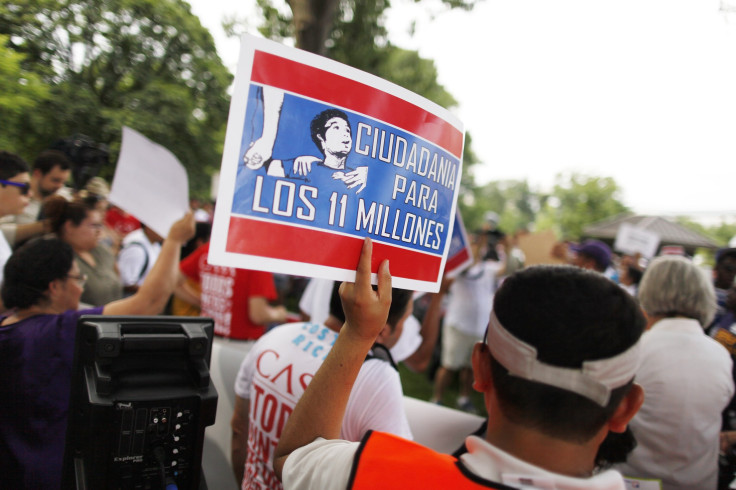
Rep. Bob Goodlatte (R-Va.), chairman of the House Judiciary Committee, said at a GOP Conference Hispanic Heritage month event on Thursday that the committee was back to work on a series of four new immigration bills. He added that House Republicans were taking action on the issue in the way they saw fit. "We are taking what we call a step-by-step approach. We have objections to the Senate bill, but we don't say we want to kill the Senate bill," he said. "We say we want to do immigration reform right." But immigrant advocates have a bone to pick with him over what he considers the "right" thing to do for the nation's 11 million undocumented.
On Thursday, Goodlatte reiterated his calls for legislation which would give undocumented immigrants legal status but no "special" path to citizenship like that proposed by the Senate's comprehensive bill. That bill would make 8 million of the nation's undocumented immigrants eligible for legal status and, after 10 years, a green card. Three years later, they could become eligible for citizenship. In Goodlatte's idea, those without papers would be able to obtain provisional legal status, then use the four existing avenues - employer or family sponsorship, refugee or asylum claims, or the "diversity visa" lottery - to attain citizenship. "That will not result in every single person who came here unlawfully getting all the way to citizenship, but I feel very strongly in my conversations with people it would be a major solution to the problem," Goodlatte said on Thursday.
Muzaffar Chishti, director of the Migration Policy Institute's office at the NYU School of Law, told the Latin Times that there was "nothing wrong" with Goodlatte's argument, but pointed out that nearly all of the existing avenues to a green card are heavily backlogged. "First of all, you have to find a sponsor. If you have a sponsor, the pathway may exist but it will take a long time for you to achieve a green card through the existing law." How long? That depends on the category and where the immigrant is from. According to the State Department, Mexican siblings of US citizens who got their green cards in July have been waiting nearly 17 years. Married sons and daughters of citizens from the Philippines waited over 20. Chinese and Indians faced shorter waits - 12 for siblings of citizens, for instance, and 7 for unmarried adult children of citizens.
Goodlatte offered no details on Thursday on the four new immigration bills his Judiciary Committee was working on, but the Associated Press notes that he and other committee members have discussed legislation which would grant extra visas to lower-skilled workers.
"There are only 5,000 visas available [per year] in our entire national labor market for low-skilled jobs. Even in the higher-skilled jobs, which require a college degree, we only have about 65,000 visas available" compared to the 11 million undocumented people living in the US now, said Chishti.
"The critical pathway is actually not citizenship, it's residence," he noted. "Because anyone who becomes a permanent resident in our country, after five years, under our current law, automatically becomes eligible for citizenship."
The nation's biggest immigrant-advocate group, America's Voice, derides Goodlatte's solution. In February, Lynn Tramonte, Deputy Director of the group's education fund, said in a press release that Goodlatte was "advocating the establishment a permanent second-class status for immigrants in America." She added, "With all due respect to the Congressman, that's not how we do things in America. We don't strive to create a tiered society, we strive for inclusion. If you're here to stay, work hard and pay taxes, you should be given the chance to earn citizenship."
RELATED: Obama Says House 'Piecemeal' Approach Acceptable If It Includes Path To Citizenship For Undocumented
© 2025 Latin Times. All rights reserved. Do not reproduce without permission.




